|
|
|
Sort Order |
|
|
|
Items / Page
|
|
|
|
|
|
|
| Srl | Item |
| 1 |
ID:
164609
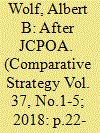

|
|
|
|
|
| Summary/Abstract |
If grand strategy is a state's theory of how to produce security for itself, what should the U.S. grand strategy be toward Iran? This is an important question that has only grown since the Trump administration announced it would not recertify Iran under the Joint Comprehensive Plan of Action (JCPOA). This article lays out four options: rollback, offshore balancing, retrenchment, and engagement. Each strategy has its merits as well as its drawbacks.
|
|
|
|
|
|
|
|
|
|
|
|
|
|
|
|
| 2 |
ID:
175513
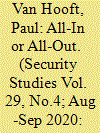

|
|
|
|
|
| Summary/Abstract |
Critics of the expansive US grand strategy of deep engagement argue that the United States should pursue strategies of retrenchment to avoid provoking conflicts with major powers and allied freeriding. Retrenchers believe the United States can rely on the inherent security its insularity and distance from other major powers provides and delay its possible interventions until strictly necessary. Should a hegemonic power emerge in Eurasia, its command of the maritime commons will allow US reentry into the region. This paper argues that such strategies are not likely to succeed for the US in Asia, but neither is the US likely to avoid escalation with China if it continues deep engagement. The balance of interests between the United States and its allies and adversaries is inherently asymmetric because the United States is a distant, offshore power. This in turn makes it difficult to convince adversaries and allies that it is willing to spend blood and treasure and to convince the domestic audience of the need to do so. Entanglement abroad and overselling at home are thus endemic in the US grand strategy. The history of US engagement in Cold War Europe illustrates how US commitments swung between the extremes of the pendulum. This paper shows how this dynamic applies to the Sino-American competition in the Western Pacific, where China seeks to raise the costs for the United States, and the United States seeks to maintain military-technological superiority to maintain access. If the United States is committed to upholding the balance of power, it must be willing to court disaster and treat China as an existential threat. In Asia, the former thus faces a stark choice between dangerous escalation and retreat.
|
|
|
|
|
|
|
|
|
|
|
|
|
|
|
|
| 3 |
ID:
169671
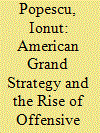

|
|
|
|
|
| Summary/Abstract |
IONUT POPESCU outlines the principles of a new American grand strategy grounded in an offensive realist theoretical framework. He argues that offensive realism is better suited to the new era of geopolitical competition with China and Russia
|
|
|
|
|
|
|
|
|
|
|
|
|
|
|
|
| 4 |
ID:
150972
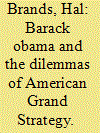

|
|
|
|
|
| Summary/Abstract |
Did the Obama administration have a grand strategy? If so, was it effective? Before Obama's presidency even ended, these questions were unleashing fusillades of contradictory commentary. Sympathetic observers credited Obama with a wise, well-integrated grand strategy that enhanced American power for “the long-game.”
|
|
|
|
|
|
|
|
|
|
|
|
|
|
|
|
| 5 |
ID:
108882
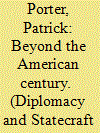

|
|
|
|
|
| Publication |
2011.
|
| Summary/Abstract |
As the United States became a world Power, journalist and intellectual Walter Lippmann feared that it would become its own worst enemy. During and after the Second World War, he tried to steer the country towards coherent statecraft, to define the national interest and the limits of power, and give geopolitical expression to the role of the United States as the core of an Atlantic strategic system. But in response to world war, the Truman Doctrine, and the Korean War, he became pessimistic about the country's ability to conduct strategy effectively. In the prophetic tradition, he believed that a fatal symbiosis between America's growing strength and domestic politics led it towards crisis. Though at times ahistorical, Lippmann's concept of strategy deserves attention for its dialogue between power and identity, for its questioning of "ends" as well as means, and for its focus on the danger of self-defeating behaviour.
|
|
|
|
|
|
|
|
|
|
|
|
|
|
|
|
| 6 |
ID:
085517
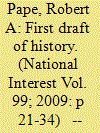

|
|
|
| 7 |
ID:
115188
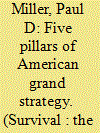

|
|
|
|
|
| Publication |
2012.
|
| Summary/Abstract |
In a previous Survival article, I argued that, contrary to widespread belief, the United States has been pursuing at least one pillar of an implicit grand strategy since the end of the Cold War: building the democratic peace. The democratic peace has informed most major US foreign-policy initiatives over at least the last two decades, and rightly so: it has many strengths to recommend it, including its harmony with values the American electorate broadly shares. But championing liberalism is only one component of US grand strategy. There are four others: defending the American homeland from attack, maintaining a favourable balance of power among the great powers, punishing rogue actors, and investing in good governance and allied capabilities abroad. Like support for democracy, these broad goals are well within the mainstream of US foreign policy; they enjoy bipartisan support, and have been remarkably consistent for decades.
|
|
|
|
|
|
|
|
|
|
|
|
|
|
|
|
| 8 |
ID:
193542
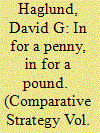

|
|
|
|
|
| Summary/Abstract |
Over the past couple of decades, students of American grand strategy have debated the merits (or lack thereof) of an orientation toward the global balance of power that has come to be known as “offshore balancing.” Its critics hold offshore balancing simply to be another way of expressing the dangerous allure of strategic “restraint,” or even “isolationism.” Its enthusiasts, by contrast, see in it nothing other than the best conceivable grand strategy for America, enabling Washington to avoid the pitfalls of either too little or too much interventionism in global affairs. This article challenges both positions, and argues that the historical record of offshore balancing as an American strategic orientation leads to the conclusion that, far from being a crypto-isolationist grand strategy, it actually betrays close affinities with the so-called “maximalism” to which its champions believe it to be superior.
|
|
|
|
|
|
|
|
|
|
|
|
|
|
|
|
| 9 |
ID:
103301
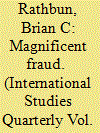

|
|
|
|
|
| Publication |
2011.
|
| Summary/Abstract |
This article seeks to overturn the conventional wisdom that World War II forced a decisive, bipartisan break in American grand strategy. As they had after World War I, American political elites debated the relative merits of unilateralism and multilateralism. Assessments of the relative costs and benefits of a cooperative and multilateral solution to American security depended on judgments about the likelihood of opportunism by America's partners. Democrats were more trusting than Republicans, expecting cooperation where the latter anticipated defection. This led to different preferences for the creation and design of the United Nations and the North Atlantic Treaty. Drawing on theories of "social orientation" and political ideology, I explain why the left is more trusting than the right. Rationalist accounts of the creation and design of the UN and NATO overstate the case for ideological convergence and therefore the importance of structure because they largely ignore behind-the-scene bipartisan consultations that allowed for a compromise prior to the votes on the respective treaties. My social psychological theory of international cooperation demonstrates that multilateralism is a dispositional trait, not a simple functional response to some objective security situation.
|
|
|
|
|
|
|
|
|
|
|
|
|
|
|
|
| 10 |
ID:
151719
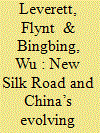

|
|
|
|
|
| Summary/Abstract |
The “new Silk Road” has emerged as the signature foreign policy initiative of Xi Jinping’s presidency and the main channel through which China is adapting its grand strategy to address daunting economic, environmental, and strategic challenges. In elite discourse, China’s “period of strategic opportunity” (zhànlüè jī yùqī 战略机遇期) is no longer defined mainly by other powers’ relatively benign postures. In this context, the new Silk Road offers unique insight into descriptions of Chinese foreign policy as becoming more fènfā yǒu wéi 奋发有为 (proactive, or self-achieving): China can increasingly leverage its own capabilities to enhance Chinese influence and secure Chinese interests by proactively encouraging greater regional and global multipolarity. While the West has long-term interests that would be well served by the new Silk Road’s success, this would also appreciably augment China’s strategic autonomy, ultimately compelling substantial adaptation in American grand strategy.
|
|
|
|
|
|
|
|
|
|
|
|
|
|
|
|
| 11 |
ID:
167321
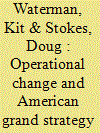

|
|
|
|
|
| Summary/Abstract |
In spite of fiscal pressure at home and China’s continued rise abroad, the United States shows no signs of reversing its costly grand strategy of deep engagement. In the context of America’s relative decline, we evaluate existing proposals to ease pressure on the United States. We argue that the key aspects of American decline are often operational rather than strategic in nature; consequently that the undifferentiated fashion in which rise and decline is often presented is not useful in describing current changes or in proposing how to address them. Problems at the operational level do not necessarily demand higher-level strategic level alterations. As such, although restructured forms of deep engagement will help alleviate resource constraints in the medium to long term, their utility in addressing the operational changes wrought by relative decline are less apparent. Given that resource constraints are not necessarily the primary concern, therefore, the major strategic elements of American deep engagement are more durable than commonly supposed. America’s current strategic objectives are not constrained by changes by virtue of its relative material decline with respect to China but by changes in the operational environment.
|
|
|
|
|
|
|
|
|
|
|
|
|
|
|
|
| 12 |
ID:
147056
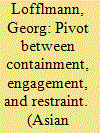

|
|
|
|
|
| Summary/Abstract |
This article examines the formulation and implementation of American grand strategy under the Obama administration, and how the “pivot to Asia” functions within this strategic context. It argues that President Obama attempts to secure continued American hegemony through a combination of cooperative engagement and restraint. This exposes a fundamental dilemma at the heart of America’s rebalancing: increased engagement with US allies and partners in the Asia-Pacific is fueling political, economic, and military competition with China. Sequestration and questions over American strategic coherence and consistency are simultaneously undermining the credibility of the pivot, both at home and abroad. The article concludes that this dilemma makes it unlikely for the pivot to succeed in its stated aims, unless the United States re-emphasizes cooperative engagement with China.
|
|
|
|
|
|
|
|
|
|
|
|
|
|
|
|
| 13 |
ID:
108844
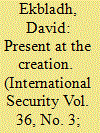

|
|
|
|
|
| Publication |
2011-12.
|
| Summary/Abstract |
Security studies, as an American field of inquiry, has particular historical origins. Contrary to standard views, it was the unraveling of the international order in the 1930s that compelled a collection of internationalist institutions and individuals, led by historian Edward Mead Earle, to bind together a variety of new and traditional disciplines to create an entirely new field focused on the problem of security. These institutions and individuals not only sought to confront the crisis at hand by influencing public views, altering academic discussion, enhancing government capacity, and creating an American "grand strategy," but also to establish strong institutional and intellectual foundations for an enduring scholarly project that would contended with future national security problems generated by the modern world. In this effort, Earle and his foundation, government, and university collaborators had significant influence on the evolution of security studies as a field that are still felt today.
|
|
|
|
|
|
|
|
|
|
|
|
|
|
|
|
| 14 |
ID:
154416
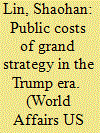

|
|
|
|
|
| Summary/Abstract |
American grand strategy is at a crossroads. The preferred trajectory of
president-elect Trump, hardball isolationism and nationalism, runs counter to
the American tradition of global leadership and liberal interventionism. Despite
Trump’s preference for a new grand strategy, it is far from preordained that he
will successfully resist Washington’s perennial pull of hegemony once sworn
into office. Therefore, it is imperative to examine the strategic preferences of
the American public, given that it has to bear the costs of this grand strategy.
So what can one expect when the public is disinterested in supporting such an
ambitious grand strategy?
|
|
|
|
|
|
|
|
|
|
|
|
|
|
|
|
| 15 |
ID:
164137
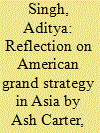

|
|
|
| 16 |
ID:
046678
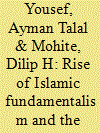

|
|
|
|
|
| Publication |
DelhI, Kalinga Publications, 2002.
|
| Description |
vi, 232p.hbk
|
| Standard Number |
8187644370
|
|
|
|
|
|
|
|
|
|
|
|
Copies: C:1/I:0,R:0,Q:0
Circulation
| Accession# | Call# | Current Location | Status | Policy | Location |
| 045429 | 955.054/YOU 045429 | Main | On Shelf | General | |
|
|
|
|
| 17 |
ID:
111921
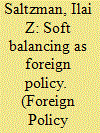

|
|
|
|
|
| Publication |
2012.
|
| Summary/Abstract |
In an attempt to increase the legitimacy and traction of soft balancing in contemporary International Relations (IR) scholarship, and in order to rebuff critiques of its applicability, the concept is further clarified and applied to examine American foreign policy vis-à-vis Japan in the interwar period. Analysis reveals that soft balancing is not only a legitimate explanation, but also explains a major historical and theoretical puzzle-American grand strategy vis-à-vis Japan in interwar period-it shows that the concept is also applicable to account for patterns in non-unipolar systems.
|
|
|
|
|
|
|
|
|
|
|
|
|
|
|
|
| 18 |
ID:
164612
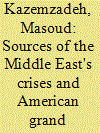

|
|
|
|
|
| Summary/Abstract |
This article argues that there are four major crises convulsing the Middle East. They are the Shia-Sunni conflict, rise of extremist militant fundamentalists, ethno-national demands, and pro-democracy movements. These have given rise to four clusters of actors. The article analyzes the ideological sources of Sunni and Shia fundamentalism, as well as Iran's grand strategy and American strategies and policies since 1979, trying to respond to these crises and challenges. It discusses the reasons for successes and failures of American policies and identifies lessons for future American policies toward the Middle East.
|
|
|
|
|
|
|
|
|
|
|
|
|
|
|
|
| 19 |
ID:
148360


|
|
|
|
|
| Summary/Abstract |
US officials will have to get used to operating in a world in which they can take less for granted.
|
|
|
|
|
|
|
|
|
|
|
|
|
|
|
|
| 20 |
ID:
167303
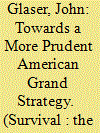

|
|
|
|
|
| Summary/Abstract |
Doing less in foreign policy does not mean isolationism or retreat.
|
|
|
|
|
|
|
|
|
|
|
|
|
|
|
|
|
|
|
|
|